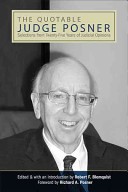'Quotable Judge Posner' Is Law Prof's Life Project

One renowned jurist on the Chicago-based 7th U.S. Circuit Court of Appeals has many admirers. But law professor Robert Blomquist is surely among the foremost fans of Judge Richard Posner.
After reading all of the judge’s more than 2,250 opinions from a 25-year period between 1981 and 2006, Blomquist has put together a book composed of his gems of jurisprudence organized alphabetically by subject area of the law. Titled The Quotable Judge Posner, it has just been published by the State University of New York Press.
“The bottom line here is that Judge Posner is one of the few appellate judges that writes his own opinions,” Blomquist, who teaches at Valparaiso University School of Law, tells the ABA Journal. “Otherwise it would be like getting quotations from law clerks.”
Blomquist says he culled down some 700 typed manuscript pages of quotations from Posner’s opinions by looking for those that best demonstrated his wit, humor and insight into the law and American society, among other qualities. The judge “comes up with just really well-reasoned insignts that everybody can learn from,” he says, regardless of their own personal political views.
Posner, for instance, is known for his ability to cut through legal verbiage to the heart of the matter:
“Modern judicial opinions tend to be too long, and we shall try to be brief,” he writes in U.S. v. Herrera-Medina, 853 F.2d 564, 565 (1988), which is quoted on page 84 of Blomquist’s book. “We shall even forgo the usual prefatory statement of facts, which would disclose an utterly routine, though very large, illegal drug operation.”
Other favorites of Blomquist’s amidst the hundreds of quotations from Posner in his book include:
“To paraphrase Gertrude Stein, for purposes of diversity jurisdiction a corporation is a corporation is a corporation.” Cote v. Wadel, 796 F.2d 981, 983 (1986).
“This ‘the dog ate my homework’ defense was no defense at all.” Lowe v. McGraw-Hill Cos., 361 F.3d 335, 339 (2004).
They can be found, respectively, on pages 120 and 171.
Blomquist interviewed the judge, which informs the law prof’s introduction to the book. Posner, he writes, thinks too many appellate lawyers are “mesmerized by precedent,” and should focus more on seeing the case from the court’s perspective. Attorneys would be more persuasive, the judge says, if they instead emphasized practical consequences and reasons why the law should be applied a certain way.
Posner himself also speaks directly in a foreword to the book, explaining why he writes his judicial opinions the way he does. He tries to strip away all nonessentials, the judge says, but “include everything that I am conscious of having influenced the decision,” in a “practical, candid and informal” opinion in plain, ordinary English.
Having spent four years on the book project, after initially developing his interest in Posner by writing law review articles about his work, Blomquist now has another project in mind. He hopes to write an article for a national magazine like the New Yorker or Harper’s, and potentially a book, about Judge Posner’s take on American law.



